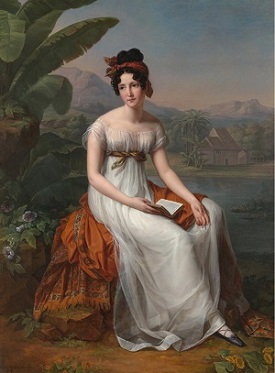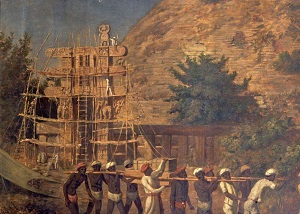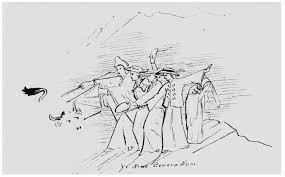The Association of Historians of Nineteenth-Century Art (AHNCA) has conferred the Dahesh Museum of Art Prize of $1000 to each of three emerging scholars who gave outstanding presentations at the AHNCA/Dahesh Twentieth Annual Graduate Student Symposium in Nineteenth-Century Art, held virtually on March 25–26, 2023.
The recipients of the award are: Isabelle Gillet, University of Michigan; Bojana Rimbovska, University of Canterbury Te Whare Wānanga o Waitaha, New Zealand; and Alex Round, Birmingham City University, UK. In particular, the jury would like to offer a special commendation to Isabelle Gillet, whose first “official” act as Dr. Gillet, was a splendid presentation from her doctoral dissertation.

Louise Bouteiller, Césarine de Houdetot, Baronne de Barante, Reading Paul et Virginie, 1818, oil on canvas, 76 1/5 x 56 1/3 in. (193.5 x 143 cm). National Gallery of Victoria, Melbourne.
Isabelle Gillet’s presentation, “Uprooted Exoticism: The Portrait of a White Aristocratic Créole in Restoration France,” focused on the 1818 portrait by Louise Bouteiller that shows Césarine de Houdetot flaunting her roots in Mauritius, the island celebrated for its famed Pamplemousses Garden and as the setting for Bernardin de Saint-Pierre’s 1788 novel Paul et Virginie. Yet, Houdetot lived there for only four years—while it was still a French colony. The portrait bespeaks a complicated image, layered with devotion to the motherland, colonial nostalgia, and white creole identity.
Isabelle Gillet has recently successfully defended her doctoral dissertation, “Figures of Conformity, Gestures of Distinction: Civility and Portraits of Women in France (1815–1848)” at the University of Michigan, where she is currently a fellow at the Institute for the Humanities. She holds an MA from Williams College and a certificate in Museum Studies from the University of Michigan. She has been a curatorial intern at both the Frick Collection and the Williams College Museum of Art, and has presented her research at the Cleveland Museum of Art, the Bibliothèque Nationale de France, and the Sterling and Francine Clark Art Institute.

Artist unknown, The Sanchi Tope (detail), 1870–1874, oil on canvas, Victoria and Albert Museum.
Bojana Rimbovska’s presentation, “From Quarries to Courts: Visualizing the Production and Movement of Plaster Casts across Imperial Space” drew on Henry Cole’s account of molding and casting operations at Sanchi, India. She considered the ways in which the production and distribution of plaster casts was entangled with processes of colonization and environmental destruction, and with the museological cultures that helped to facilitate the spread of these fragile facsimiles across imperial space.
Bojana Rimbovska is a doctoral student at the University of Canterbury Te Whare Wānanga o Waitaha, where she completed her BA with First-Class Honors and her MA with Distinction. Her research focuses on replication and flows of material culture in the long nineteenth century, with a specific interest in colonial antipodean contexts. She has presented her research at conferences of the Association for the Study of Literature, Environment & Culture of Australia & New Zealand.

Barbara Leigh Smith, Ye Newe Generation, 1850, Ink on paper, 174 x 110mm. By permission of the Mistresses and Fellows, Girton College, Cambridge.
Alex Round’s presentation, “‘Sisters in Art’: Reassessing the Pre-Raphaelite Sisterhood”
examined the impact of friendships among Pre-Raphaelite women artists and writers, showing how they used their friendships to challenge the masculine structures of the art world and the wider Victorian culture. She discussed their lives, their individual and collaborative achievements, and their creative agency as distinct from the Pre-Raphaelite Brotherhood.
She is completing her doctoral dissertation, “‘Sisters in Art’: Reassessing the Pre-Raphaelite Sisterhood,” at Birmingham City University, UK. Her PhD is currently funded by Midlands4Cities, in partnership with the Arts and Humanities Research Council. She is a trustee of the Birmingham and Midland Institute, as well as co-founder of the Pre-Raphaelite Society Podcast Series and its Graduate Network. She has published in The Victorian Web, The Victorianist and the PRS Review and has an essay in the forthcoming summer issue of the Poetry Birmingham Literary Journal. She is co-editor of the forthcoming anthology from University of Delaware Press, Forgotten Sisters: Overlooked Pre-Raphaelite Women.
* * *
A future event, “Dahesh Prize Redux,” will be scheduled as part of the AHNCA/Dahesh Virtual Salon series, which will give the prize recipients the opportunity to revisit their presentations and discuss their ongoing research.


